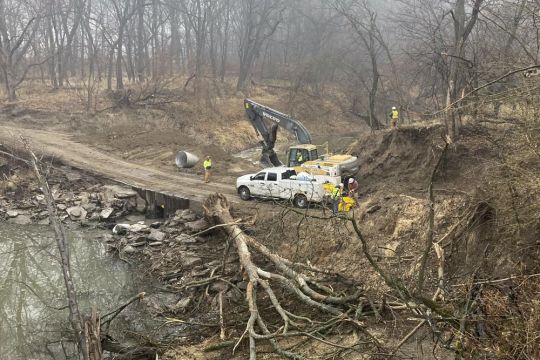An oil spill in a creek in northeastern Kansas shut down a major pipeline that carries oil from Canada to the Texas Gulf Coast, briefly causing oil prices to rise on Thursday.
Canada-based TC Energy said it shut down its Keystone system on Wednesday night following a drop in pipeline pressure. It said oil spilled into a creek in Washington County, Kansas, about 150 miles (241 kilometres) north west of Kansas City.
The company said the pipeline segment where the spill occurred had been “isolated” and that the company was using booms, or barriers, to keep the spilled oil from moving downstream. It did not say how much oil was spilled or what caused the spill.
“People are sometimes not aware of the havoc that these things can wreak until the disaster happens,” said Zack Pistora, who lobbies the Kansas Legislature for the Sierra Club’s state chapter.
Concerns that spills could pollute waterways spurred opposition to plans by TC Energy to build another crude oil pipeline in the Keystone system, the 1,200-mile Keystone XL, which would have cut across Montana, South Dakota and Nebraska.
Critics also argued that using crude from western Canada’s oil sands would make climate change worse, and President Joe Biden’s cancellation of a US permit for the project led the company to pull the plug last year.
In 2019, the Keystone pipeline leaked an estimated 383,000 gallons (1.4 million litres) of oil in eastern North Dakota, damaging about five acres.
Janet Kleeb, who founded the Bold Nebraska environmental and landowner rights group that campaigned against the Keystone XL, said there have been at least 22 spills along the original Keystone pipeline since it went into service in 2010.
She said studies have shown that the type of heavy tar sands oil the pipeline carries can be especially difficult to clean up in water because it tends to sink.
“All oil spills are difficult, but tar sands in particular are very toxic and very difficult, so I’m awfully concerned,” said Ms Kleeb, who is also the Nebraska Democratic Party’s chair.
But the US Environmental Protection Agency said there were no known effects yet on drinking water wells or the public.
TC Energy said in its statement: “Our primary focus right now is the health and safety of onsite staff and personnel, the surrounding community, and mitigating risk to the environment through the deployment of booms downstream as we work to contain and prevent further migration of the release.”
There was a brief surge in oil prices midday on Thursday as word of the spill in Kansas began to spread, with the cost for a barrel of oil for near-term contracts rising by nearly 5%, and above the cost of oil contracts further into the future. That typically suggests there is anxiety in the market over immediate supply.
A US Energy Information Administration spokesperson said the Keystone pipeline moves about 600,000 barrels of oil per day from Canada to Cushing, Oklahoma, where it can connect to another pipeline to the Gulf Coast. That is compared with the total of 3.5 million to four million barrels of Canadian oil imported into the US every day.







